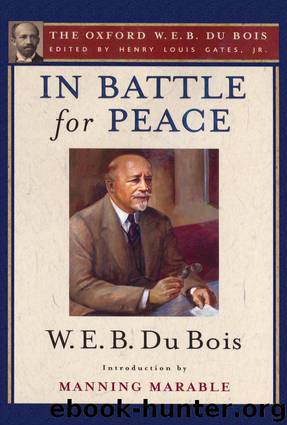In Battle for Peace (The Oxford W. E. B. Du Bois) by Gates Henry Louis Jr.; Du Bois W. E. B.; Marable Manning

Author:Gates, Henry Louis Jr.; Du Bois, W. E. B.; Marable, Manning
Language: eng
Format: epub
Publisher: Oxford University Press
Published: 2013-10-26T04:00:00+00:00
CHAPTER XI
Oh! John Rogge
What induced the United States Government to attempt to intimidate or jail five American citizens? We were not prominent nor especially influential. We had no wealth nor power. Of the five, I was best known; but I was known as a “Negro” and not as an American. Every reference to me was always accompanied by reference to my race. This labelled me, and excluded me from further consideration except in discussion of the Negro problem.
But what upset the State Department was that the activity of a small group of no influence was bringing out an extraordinary evidence of peace sentiment in this country which seemed to be growing. The powerful influences ruling the nation wanted this stopped and stopped quickly. Pontifical pronouncements by the State Department could get wide publicity in the monopolized press, but these ukases could be answered and were. The debate on Peace thus begun could be effectively silenced only by legal force, and legal force was most quickly available if in some way the smear of “Communism” could be applied. The best method of securing testimony on this matter seemed to be John Rogge, a coworker with the accused, a personal friend of them and their friends, in whose home the Peace Information Center was conceived.
Of such an eventuality, we of the Center had no inkling, until, on sending our attorney to Washington, she unexpectedly met Rogge emerging from the Grand Jury room. From that day on we recognized his role, and while astonished, we were not as surprised as some might have imagined. For his friends had begun to know John Rogge.
Oetje John Rogge was born in west central Illinois in 1904, of a German immigrant father and a mother whose father was born in Germany. He writes frankly: “I went to school to equip myself to make money.” He was graduated at the University of Illinois and the Harvard Law School. He began to practice corporation law in Chicago in 1925, and his firm made much money. But the crash came in 1929 and one of his partners was ruined. After a year of post-graduate study, with a view to possible teaching, Rogge returned to law practice. In 1937 he entered government service where he remained until 1946, when he was dismissed for attacking German cartels and their American representatives, who were “Big Business”; or, if not actually dismissed, his relations with the Department of Justice thereafter remained secret.
This made Rogge a national figure. He received invitations to speak and concluded that the way to success was in alliance with progressive movements, with personal popularity, and a possible political career ahead. But it was the success that Rogge wanted; of that he had no doubt and few moral scruples. He turned away from an offer to return to corporation practice, “with the best little law shop there was, catering to blue chip clients” and labor matters “for employers.” He took civil right cases, joined the Progressive Party and attended peace congresses.
Download
This site does not store any files on its server. We only index and link to content provided by other sites. Please contact the content providers to delete copyright contents if any and email us, we'll remove relevant links or contents immediately.
| Africa | Americas |
| Arctic & Antarctica | Asia |
| Australia & Oceania | Europe |
| Middle East | Russia |
| United States | World |
| Ancient Civilizations | Military |
| Historical Study & Educational Resources |
Cat's cradle by Kurt Vonnegut(15335)
Pimp by Iceberg Slim(14488)
4 3 2 1: A Novel by Paul Auster(12375)
Underground: A Human History of the Worlds Beneath Our Feet by Will Hunt(12090)
The Radium Girls by Kate Moore(12018)
Wiseguy by Nicholas Pileggi(5770)
The Fire Next Time by James Baldwin(5431)
Perfect Rhythm by Jae(5398)
American History Stories, Volume III (Yesterday's Classics) by Pratt Mara L(5301)
Paper Towns by Green John(5179)
Pale Blue Dot by Carl Sagan(4996)
A Higher Loyalty: Truth, Lies, and Leadership by James Comey(4954)
The Mayflower and the Pilgrims' New World by Nathaniel Philbrick(4495)
The Doomsday Machine by Daniel Ellsberg(4484)
Killers of the Flower Moon: The Osage Murders and the Birth of the FBI by David Grann(4435)
The Sympathizer by Viet Thanh Nguyen(4385)
Too Much and Not the Mood by Durga Chew-Bose(4338)
The Borden Murders by Sarah Miller(4313)
Sticky Fingers by Joe Hagan(4188)
